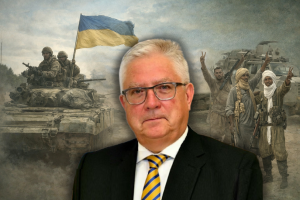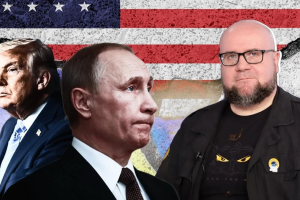Ilko Kucheriv “Democratic Initiatives Foundation” – For “Ukrainian Pravda”
The Ilko Kucheriv “Democratic Initiatives Foundation” offers a series of publications for “Ukrainian Pravada” – the goal is to elucidate the possible reactions of our citizens to the questions asked by the President based on the available sociological data.
It is important to note that the data presented in this article comes from a recent representative nationwide survey. Some citizens will choose to come to the ballot box and some will not, some will take part in the survey initiated by the President and some will not, which is why it is critical that the data presented in this article takes into account the opinions of all Ukrainians.
From August 22 to August 31, 2020, 2005 respondents were interviewed in all regions of Ukraine, except for Crimea and the occupied territories of Donetsk and Luhansk oblasts via face-to-face interviews at the respondents' place of residence. This sample is representative of the adult population and takes into account gender, age, the type of settlement, and the region. The theoretical sampling error does not exceed 2.2%.
The war in the Donbas region and the search for ways to end it do not only determine the future of the country, but also determine the fate of Ukraine’s politicians. It forces political actors to look for solutions that both please the voters and demonstrate the progress in addressing the issue.
Petro Poroshenko emphasized forceful resistance and the formation of the international coalition aimed to isolate Russia and punish it for the aggression. President Zelenskyi has a different approach – he negotiates with the state of the aggressor to find a compromise for the sake of peace. To achieve this goal, Ukraine’s President should strengthen his negotiation posture. The project of the reconstruction of the post-conflict Donbas is one of the means to achieve this goal.
Towards the end of July, the Head of the Trilateral Contact Group Leonid Kravchuk touted the idea of the free economic zone in the occupied territories of Donbas as a possible compromise when negotiating Russia.
Oleksiy Reznikov, the Minister for Reintegration of Temporary Occupied Territories offered his interpretation of the step. According to him, this approach would allow Ukraine to attract investors and foster economic development in the Donbas region, which would make Ukraine more attractive to those living in the occupied territory.
However, the discussion of the free economic zone has remained out of focus in mass media – that is, until it was raised in one of the “5 important questions” from Ukraine’s President. The document released by the Presidential Office does little to shed light on the essence of the free economic zone and will likely remain unnoticed by the broad public.
Consequently, it is important to ask the following question: do Ukrainians support the creation of the free economic zone in Donbas and what results are to be expected from the President’s survey?
According to a survey conducted by the Ilko Kucheriv “Democratic Initiatives Foundation” jointly with the Center of Political Sociology from 22 August and 31 August 2020, citizens do not have a uniform opinion on the matter and are not informed about its substance: 29% of Ukrainians approve of the creation of the free economic zone in the Donbas region, 20% have a negative attitude towards the initiative, and the remaining 51% have either no knowledge of it (33%) or don’t have a definite opinion (18%).
The lack of knowledge about the initiative to create the free economic zone cuts across all regions of Ukraine. In the South and the East (37% vs. 23-25% in the West and Center) the approval of the initiative is slightly higher. Still, it is important to acknowledge that even the respondents who have an opinion on the matter are strongly influenced by political preferences and the attitude towards the high-ranking governmental officials, including the President.
For instance, the supporters of the “Opposition Platform – For Life” party are most likely to support the introduction of the free economic zone – they also tend to support other proposals that seek a compromise with the state of the aggressor. At the same time, the supporters of the presidential party “Servant of the People” tend to be more reserved towards the initiative.
The citizens that support the introduction of the free economic zone tend so seek compromise with Russia, including concessions for Kremlin as part of the Minsk process. In particular, those who support the idea of holding the elections on the occupied territories of Donbas tend to favor the creation of the free economic zone. In contrast, those who support a more rigid position (holding elections following deoccupation) are less likely to approve of the free economic zone:
One can make a careful assumption that those who favor the pro-Russian rhetoric support the creation of the free economic zone, and those who favor a more rigid official stance (including the supporters of the President’s party) tend to be more reserved about the initiative.
Therefore, the chief risk is that the pro-Russian forces will attempt to employ the narratives and political decisions around the idea of the free economic zone to create social tension as has already happened with other ideas aimed at peacemaking in the region.
In this context, the effective communication of the idea to create the free economic zone in Donbas from the government is of great importance. This communication should aim to protect citizens from the manipulations by partisan and oligarch-owned media that aims to polarize society.
Employing the topic of war in the Donbas region for political agenda is no great strategy. Hopefully, the pre-electoral hype is not the only goal of starting the discussion about the introduction of the free economic zone in Donbas. Otherwise, this potentially valuable initiative will be drowned at the sea of media populism.
Commentary of Maria Zolkina, analyst at the Ilko Kucheriv Democratic Initiatives Foundation: The pros and cons of the free economic zone in Donbas
As far as the pros of the idea are concerned, economic development, which can be fostered in many ways, including the introduction of the free economic zone, corresponds with the expectations of the residents of Ukraine-controlled Donbas.
There is considerable sociological evidence from the Ukraine-controlled Donbas that the matters of the economy are of critical importance when it comes to improvement of the social well-being of the citizens, the increase of loyalty towards the Ukrainian scenario of handling conflict, and the increase of trust towards Ukrainian authorities.
Thus, according to the regional survey conducted in February 2020 in the Ukraine-controlled Donbas, the popular request to rebuild the industrial base of the region and the creation of new jobs has by far dominated the discourse as well sidelined other issues. Further, it is the violation of economic and social rights that the residents of Donbas bring up most often – not the political and civic rights and freedoms. At the same time, the residents see no solution to these issues other than the initiative of the government.
The other advantage of strengthening the economic potential of the region is to indirectly shape the positive perception of the reintegration prospects among the residents of the occupied Donbas. Granted, this reintegration is to ever take place.
The person-to-person communication channel between the residents of the Ukraine-controlled and occupied territories is underestimated. The news from the territories controlled by Ukraine are broadcasted to the occupied Donbas, by and large, when direct communication between the people occurs. Thus, the improvement of the socioeconomic conditions is an opportunity to affect the interpersonal discourse. This development will not automatically lead to the change of heart of those who live in the occupied territory or launch a popular movement to rejoin Ukraine. Still, it will contribute to the Ukraine-oriented discussion of the reintegration processes or, to say the least, preserve the interpersonal connections with the residents of the occupied territory.
Along with the pros of the introduction of the free economic zone, it is important to consider the potential cons of the initiative.
It is unclear what the introduction of the free economic zone would bring: what groups would it prioritize? The question is whether the government would choose to cooperate with the big businesses or foster the growth of the middle-market companies. If the big businesses are the answer, it is very likely that supporting them will expand the influence and property ambitions of oligarchs or “local clans”, a development that has a precedent. At the end of the 1990s, special economic zones in Donbas became a tool for the industrial giants in the region to evade taxes – for the government, this meant massive losses and became an impediment that hampered foreign investors.
If the preferment concerns the small businesses and middle-market companies, it is important to take into account that the entrepreneurship activity in the region is low, compared to the other regions in Ukraine. Thus, according to the survey conducted in February 2020, it is notable that only 6% of the Ukraine-controlled residents in the Luhansk region considered interest-free credit to start a business a desired tool of governmental assistance when presented different options. In the Donetsk region, the proportion of those interested in the measure is higher – 20%.
A strong case for the flow of foreign investment is questionable. As long as the legal system continues to struggle, one cannot expect foreign investors to rush in no questions asked – even if a ceasefire would be fully completed.
Paradoxically, the introduction of the free economic zone may threaten the prospects of reintegration. In short, the stabilization of the frontline territories controlled by Ukraine will hamper the popular support among the locals for a swift “reunification” at any cost.
In 2019, the public opinion survey in the Ukraine-controlled territory indicated for the first time that the local residents believe that the conditions in this territory are not changing for the worse. The detailed focus groups reveal a novel tendency: peace and the reincorporation of the occupied territories are perceived through the prism of the socioeconomic consequences for the larger region. In other words, if the free economic zone does raise the standard of living in the Ukraine-controlled territories, locals may increasingly prefer the status-quo to reintegration, which can worsen the conditions in the region. As soon as there is something to lose, the demands of the citizens get more reserved.
To avoid the polarization, the groundwork for the free economic zone and is implementation in the Ukraine-controlled Donbas requires control measures by the civil society, independent experts, and representatives of the territorial units in Donetsk and Luhansk regions. Further, the support of Ukraine’s international partners is much needed. It is important to keep the peacemaking process away from the rivalry by parties and elites.








